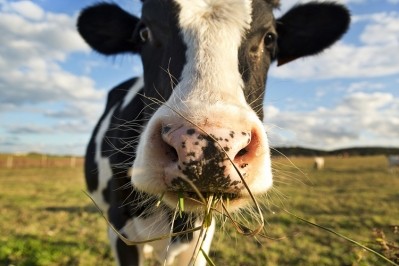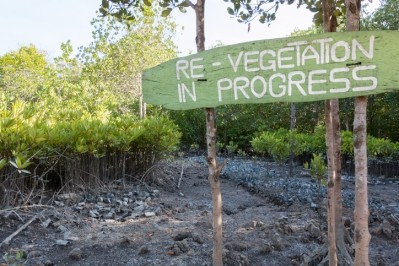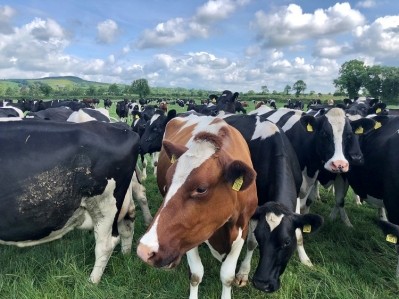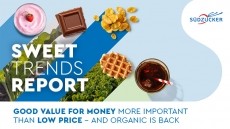Origin Green: Ireland’s sustainability project and how it changes dairy production

“I suppose the challenge for us is for the next generation is how can we make this farm more sustainable,” said Eamonn Lonergan, who runs Knockanore farm with his son Ed. “One of the things we're looking at the moment with one of the state agencies is to get good independent advice that will put on the plan, not for two years or three years but for the next 20 years.”
Launching in 2012, Origin Green is the Irish government’s programme to help the food and drink sector be more sustainable. The first, and only, of its kind, it has more than 300 company members and more than 55,000 farmers. It represents over 90% of Irish food and drink exports, as well as 70% of its domestic retailers. Combined, Origin Green verified companies have set nearly 2,800 sustainability targets.
The dairy industry is a heavy emitter, accounting for 3.4% of the world’s greenhouse gas emissions (nearly twice that of aviation). Origin Green has not neglected dairy – 26,000 carbon assessments have been done on beef and dairy farms in the past five years, and farms joining the Sustainable Dairy Assurance Scheme (SDAS) led to a 9.4% reduction of carbon dioxide per unit of milk produced. But farms must still put all their efforts into sustainability.
Making progress
Origin Green provides a national structure for sustainability measures, providing the food and drink sector with the impetus to cut down on emissions. It is independently verified and incorporates most of Ireland’s food and drink sector. Origin Green recognises members who have performed well with a gold membership.
“It's definitely given us the sort of unified voice in terms of if you go to trade shows around the world, it's the Irish dairy, with the Origin Green umbrella there,” Seán O'Brien, communications manager at dairy coop Ornua, told FoodNavigator.
“So it's got that recognition over that decade or so of strong investment. But it's also recognised at producer level . . . some of the other standards as well, like the Sustainable Dairy Assurance Scheme being introduced.
“All of these schemes and initiatives are really, really vital in terms of bringing structure, and I think Irish farmers and producers and the coops all understand how we're perceived elsewhere, and are striving to improve on what we feel is a strong reputation globally. Origin Green definitely supports that.”
Nitrogen and white clover
Grass needs nitrogen to grow. However, historically this has meant using large quantities of nitrogen fertiliser, which is expensive and bad for the environment, contributing to climate change and harming the ozone layer.
Using white clover, as many farms under Origin Green have done, provides a solution. White clover has rhizobia bacteria in its roots, which can help grass get the nitrogen it needs to grow abundantly. An increase in white clover on grassland means an increase in sustainability.

“We're trying to do more with white clover, growing it in about 20% of our land base,” Ed told us. “So the main reason there is as soon as the clover is up and working it'll fix the nitrogen in the grass or in the soil and we'll be able to reduce our chemical fertilizer by that amount, which will be great.”
Kerry Foods Farm also uses clover. “We’re trying to incorporate this guy here, clover,” Connor O’Leary, farmer at Kerry Foods Farm, told FoodNavigator, “and it takes atmospheric nitrogen and it [allows the grass] to grow and if you cut down the chemical nitrogen in the paddocks for the cows you'll be able to go off half as much, these paddocks need half as much in as the ones that don't have clover in them.
“It's 35% more palatable for the cows, and you're getting better graze and it's cutting down on waste grass, we're getting better utilisation of the grass and the cows are eating better.
“I mean if you have clover in the sward about 20% it'll replace about 100 kilos of chemical nitrogen, so chemical nitrogen is quite expensive [compared to] clover. [Instead] you're taking atmospheric nitrogen so it's a cheap form of fertilizer.”
Small scale
Ireland, unlike the UK and much of Europe, is not heavily industrialised. Its agricultural sector still relies heavily on small family farms.
This, even without Origin Green’s sustainability measures, has a clear benefit in terms of keeping carbon emissions as low as possible.
“We could have doubled the amount of cows here if we wanted to,” said Kerry Foods’ O’Leary. “We could have doubled the amount of cows by feeding more concentrates. But then, we wouldn't have enough grass, so then so we'd have to feed more and more concentrates, which are going to produce more and more. It's going to drive our carbon footprint through the roof.”
It's because of the small scale of the farming that Irish farms can afford to feed their cows grass, rather than concentrated feeds such as soy which have a heavy toll on the environment.
Being small scale means that farms often undertake the entire production process on site. This process is assured by Origin Green to be sustainable.
“Origin Green affects the business more than the farm because we're linked and our main supplier is ourselves,” Knockanore’s Ed told us. “We're part of the Sustainable Dairy Assurance Scheme here as well and that's one of our main ways of complying with being a sustainable supplier to ourselves.”
This small scale, and subsequent level of control, is what allows Irish dairy farms to be so successful with their sustainability efforts.

























